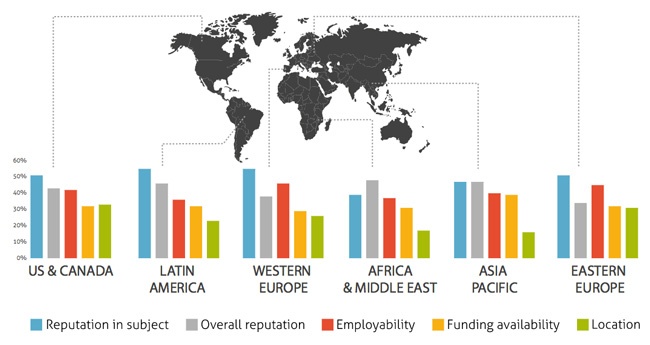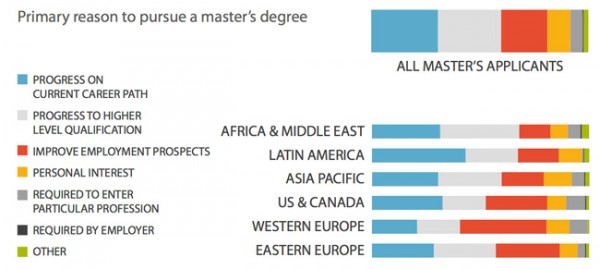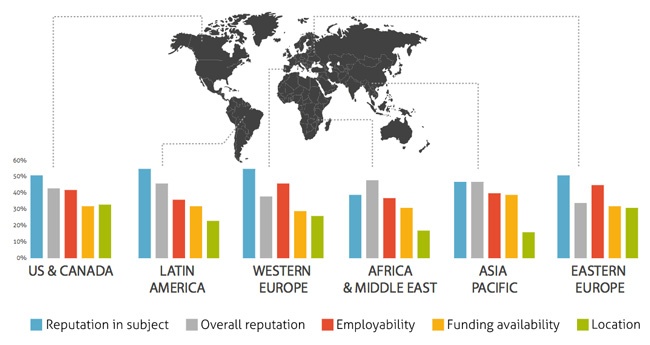
Did you know that in the United States, first time graduate enrollment grew by 3.5% between fall 2013 and fall 2014? The Council of Graduate Schools’ (CGS) report Graduate Enrollment and Degrees: 2004 to 2014 provides tons of information on graduate study trends. According to the report, “from 2004 to 2014, international students accounted for over two-thirds of the growth in first-time enrollment headcounts at U.S. graduate institutions.” And that first time enrollment figure is 11.2%. So lots of new international students and the vast majority of them at the grad level. Good news for international recruiters, right? We think so!
Bottom Line: Graduate students are an important segment of international students to target with your digital marketing and their needs are different than their younger counterparts. Their motivations to study, the programs of interest and the influences for them to choose one program over another all vary. Mostly, they want to know they will get a job with a degree from your program. Similar to undergrad motivations but perhaps iwth a finer point on it.
Importantly, even if your institution is lesser known, you can still market the strengths of a top-tier program to these highly motivated students. They pay attention to that kind of thing within their area of interest. If your marketing efforts to international graduate students are limited in time and budget (whose aren't?), you would do well to focus on these two things: your career outcomes and your highly acclaimed departments and professors. Make sure you are capturing your target audience's attention with messaging they’ll react to.
NAFSA is right around the corner! We will be co-presenting new research with FPPEDUMedia on how current global, economic and political events are impacting students’ plans to study abroad. So, while you are building your schedule for the conference, pencil us in for Wednesday, June 1 at 10AM and schedule a time to chat with us! Actually, use a pen, you really won’t want to miss this one. Trust us!
Talking grad students is tricky, right? They all vary in age, some straight from their bachelor's program and others coming from the workforce—employed or unemployed, families in tow. But it turns out that their motivations for study are a little more consistent than you might think. And they have far more clarity of purpose than international undergraduate students.
In April, ICEF Monitor reported on a survey done by Quacquarelli Symonds (QS) titled the "QS World Grad School Tour Applicant Survey" (download requires registration). They gathered survey responses from 7,153 students in the first half of 2015. With a geographically diverse sample, they were able to determine trends for international graduate study.
The majority of PhD and master’s applicants cite that their main motivation for graduate study is to “progress in their current career, to improve their employment prospects more generally, or to enter a particular profession.” A whopping 60% of master’s applicants mentioned this as their motivation.
Career advancement is such an important factor for your marketing. Why? Because that means personal interest in a field of study has declined as a motivator for graduate study in favor of whether the degree will move their career to a new level. Your messaging needs to address these benefits of your institution and the specific program to convert these prospective international graduate students.
According to the survey results, depending on the global region, students gave equal weight to your institution’s reputation in a specific field of study and your institution’s overall rank. This too is significant. While undergraduates strive to be admitted to the ivies and other highly ranked institutions, graduate students are looking for quality programs in their field of interest. If your school is lesser known and lower ranked as a whole, but has a really well known program in a specific subject, use that to your advantage. World renownded professors and researchers are key to your success.

Image Source: ICEF Monitor; Information Source: Council of Graduate Schools
The report also found that the U.S. and the United Kingdom remain important destinations for these students, while there was increased interest in Germany and decreased interest in France (hello, high youth unemployment rate! see last week’s blog post for more on this).
In terms of choosing where to study, 63% of students cited “international recognition of degrees,” 57% cited “scholarship/financial aid availability,” and 52% mentioned “cultural interest in and lifestyle of destination.” The least common reasons for choosing a study destination were the proximity of the location to their house and acquiring a visa.
You hear us beat that employability drum all the time. Graduate students want to know the cold hard facts about how well your alumni stand up and advance in the job market. While this may not be a revelation, it’s important to note that this is a steadfast trend in graduate student motivations. Market your career services and show off your career placement rates.

Image Source: ICEF Monitor; Information Source: Council of Graduate Schools
Graduate students are also focusing on employability by choosing the most desirable fields of study. The CGS 2014 report shows that 57% of international graduate students pursued STEM degrees (talk about employability!). In comparison, only 16% of American graduate students studying for degrees in these fields. What are they thinking? Perhaps they are still more focused on personal interest in a field of study as more important to them than the job placement/career advancement opportunities.
So, how do you attract potential international graduate students? Focus on what is important to them. Be sure to highlight the cultural hub that your campus is and show students that your degree will be recognized elsewhere. Create marketing messages aimed at promoting your school’s reputation, highlight scholarships and stipends specific to graduate study and show employability statistics. Additionally, make links to your STEM programs accessible and show off your STEM degrees to help set your institution apart.
It can be difficult as an institution to prioritize one type of program over another in your marketing. All departments want to be treated equally. The reality is that some of your degrees are more sought after in different parts of the world. An egalitarian approach to marketing across all departments will not win. It will make your institution look generic and you will lose students to your more focused competitors. Internally, this is a hard sell and politically charged issue. But if your colleagues are holding your feet to the fire to achieve your enrollment numbers, some difficult marketing decisions must be made.
We know it can be hard, but someone's got to show them the way. Why not you? Let us know if we can help.

